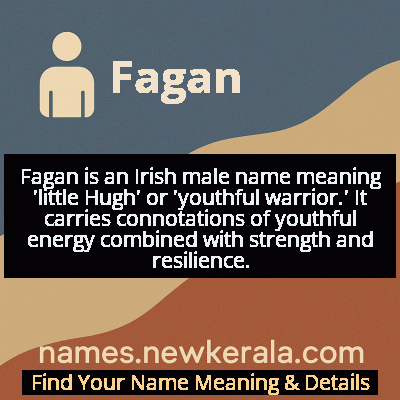Fagan Name Meaning & Details
Origin, Popularity, Numerology Analysis & Name Meaning of Fagan
Discover the origin, meaning, and cultural significance of the name FAGAN. Delve into its historical roots and explore the lasting impact it has had on communities and traditions.
Name
Fagan
Gender
Male
Origin
Irish
Lucky Number
2
Meaning of the Name - Fagan
Fagan is an Irish male name meaning 'little Hugh' or 'youthful warrior.' It carries connotations of youthful energy combined with strength and resilience.
Fagan - Complete Numerology Analysis
Your Numerology Number
Based on Pythagorean Numerology System
Ruling Planet
Moon
Positive Nature
Diplomatic, friendly, artistic, empathetic.
Negative Traits
Over-sensitive, moody, indecisive, prone to self-pity.
Lucky Colours
Green, cream, white.
Lucky Days
Monday.
Lucky Stones
Pearl, moonstone.
Harmony Numbers
1, 3, 4.
Best Suited Professions
Diplomats, mediators, caregivers, artists.
What People Like About You
Cooperative spirit, friendliness, artistic talent.
Famous People Named Fagan
Fagan of Bristol
Religious Figure
Legendary Irish bishop who founded St. Augustine's Abbey in Bristol
Fagan of Ireland
Saint
One of the first Christian missionaries to Ireland, companion of Saint Patrick
Art Fagan
Sports Coach
Renowned American swimming coach who trained multiple Olympic athletes
Ronnie Fagan
Law Enforcement
Former Commissioner of the Royal Bahamas Police Force
Name Variations & International Equivalents
Click on blue names to explore their detailed meanings. Gray names with will be available soon.
Cultural & Historical Significance
The name represents a connection to Ireland's early Christianization and the preservation of Gaelic culture through centuries of political change. During the Norman invasion and subsequent English rule, many Fagans maintained their Catholic faith and Irish identity, with some branches of the family becoming notable in Irish politics and society. The name carries the weight of Irish resilience and cultural continuity despite historical challenges including colonization and the Great Famine, serving as a testament to the endurance of Irish heritage and identity across generations.
Extended Personality Analysis
Individuals named Fagan are often characterized by their strong sense of tradition and loyalty to family and community. They typically possess a quiet determination and resilience that enables them to overcome challenges with grace and persistence. Many Fagans demonstrate a natural leadership quality combined with practical wisdom, making them reliable problem-solvers in both personal and professional contexts. Their Irish heritage often instills a deep appreciation for storytelling, music, and cultural traditions, which they may express through various creative outlets or community involvement.
Fagans tend to be thoughtful and introspective, valuing meaningful connections over superficial relationships, and they often serve as pillars of strength within their social circles. While they can be reserved initially, once trust is established, they reveal a warm, humorous, and deeply caring nature that endears them to others. Their combination of traditional values and adaptive thinking allows them to navigate modern challenges while maintaining their core identity, often becoming respected figures in their communities who bridge generational and cultural divides.
Modern Usage & Popularity
In contemporary times, Fagan remains primarily used as a surname rather than a given name, though it has seen occasional use as a first name, particularly in Irish-American communities seeking to honor their heritage. The name maintains a modest presence in Ireland and among the Irish diaspora, often chosen by families wanting to preserve ancestral connections. While not among the most popular Irish names today, Fagan carries a distinctive quality that appeals to parents seeking unique yet historically significant names. In recent decades, there has been a slight resurgence of interest in traditional Irish surnames as first names, which has benefited names like Fagan. The name is most commonly found in Ireland, the United States, Canada, Australia, and the United Kingdom, with concentrations in areas with significant Irish immigrant populations. Its usage remains steady but uncommon, making it a distinctive choice that stands out while maintaining cultural authenticity.
Symbolic & Spiritual Meanings
Symbolically, Fagan represents endurance, heritage, and spiritual foundation. The name carries connotations of ancient wisdom and cultural continuity, symbolizing the preservation of identity through generations. As 'little Hugh' or 'youthful warrior,' it embodies the paradox of gentle strength—the combination of youthful energy with warrior resilience. The name's Christian missionary associations add layers of spiritual dedication and cultural transformation, representing bridges between traditions and the courage to maintain faith through adversity. Fagan symbolizes the Irish experience of maintaining cultural identity despite external pressures, making it emblematic of resilience and authenticity. The name also carries undertones of guardianship—both of family legacy and cultural memory—suggesting someone who protects and preserves what matters most. Its historical roots in early Irish Christianity lend it spiritual significance as a name that represents foundational faith and cultural bedrock.

